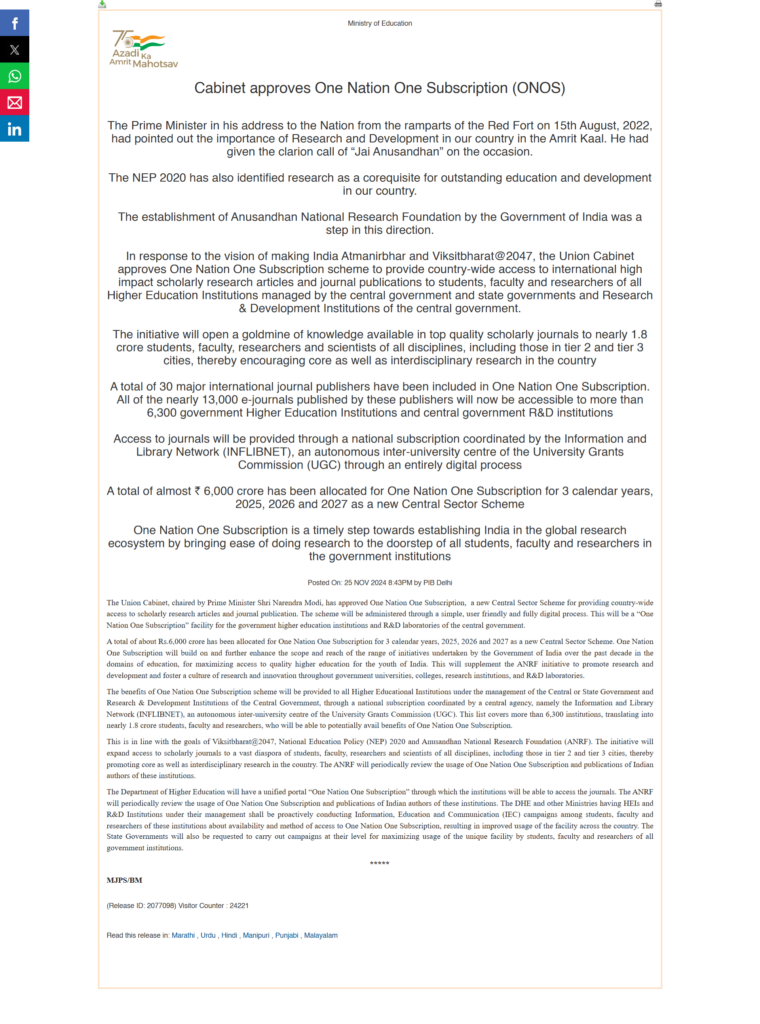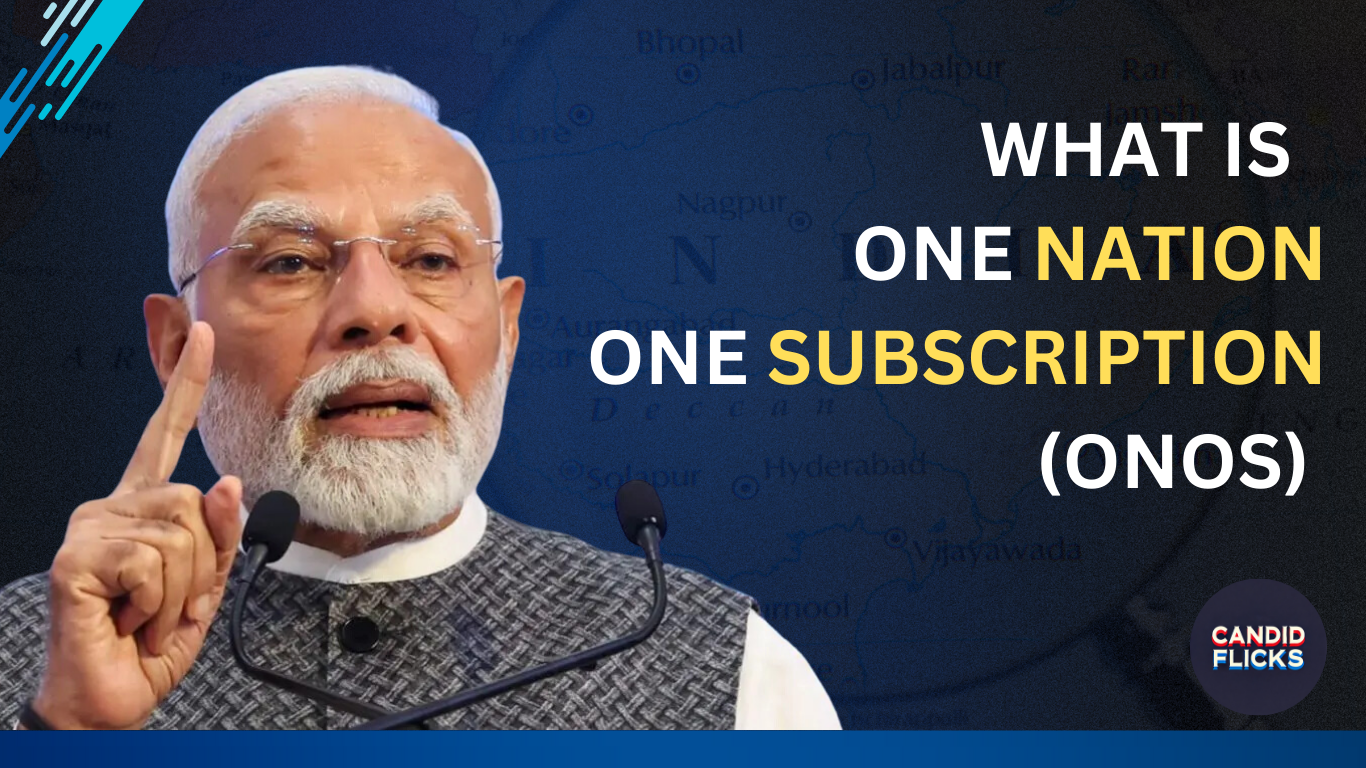What is One Nation One Subscription? Know All About this Scheme Here
One Nation, One Subscription: A Detailed Perspective on India’s Revolutionary Knowledge Initiative

The Indian government’s One Nation, One Subscription (ONOS) initiative is poised to transform how citizens access research and educational resources. By centralizing the subscription process to leading academic databases, journals, and research platforms, ONOS aims to make high-quality knowledge accessible to all. This bold step reflects the government’s commitment to bridging the knowledge divide, fostering innovation, and empowering citizens with the tools necessary to thrive in a globalized world.
What is One Nation, One Subscription?

The One Nation, One Subscription (ONOS) initiative is a centralized subscription model wherein the government negotiates bulk deals with publishers of academic journals, research papers, and knowledge databases. Once subscribed, these resources will be freely accessible to every Indian citizen, irrespective of their institutional affiliation.
This plan addresses the prohibitive cost of individual subscriptions, which has historically limited access to high-quality academic material to elite institutions and well-funded researchers.
Key Objectives of ONOS
- Universal Access to Knowledge: The initiative envisions a knowledge ecosystem where every Indian—students, researchers, educators, or lifelong learners—can access global academic resources without financial barriers.
- Cost-Effective Resource Management: By centralizing subscriptions, the government eliminates redundancies where individual institutions pay separately for the same resources.
- Strengthening Research Ecosystems: The availability of diverse and extensive resources can significantly enhance India’s research output, fostering innovation and boosting competitiveness in the global academic and industrial landscape.
- Empowering Remote Areas: ONOS ensures that even individuals in rural and remote parts of the country have access to the same resources as those in metropolitan areas.
The Need for ONOS in India
- Cost Barriers to Research: Subscribing to international journals and databases like Springer, Elsevier, or JSTOR can cost lakhs of rupees annually, often making them inaccessible to smaller institutions and independent researchers.
- Inequity in Access: India’s academic landscape is divided between elite institutions with access to top-tier resources and smaller colleges or researchers who struggle to afford such subscriptions.
- Boosting Research Quality: Lack of access to recent publications often hampers the quality of research. ONOS can change this by providing cutting-edge resources.
- Aligning with NEP 2020: The National Education Policy (NEP) 2020 envisions India as a global knowledge superpower. ONOS directly supports this vision by making knowledge resources universally available.
How ONOS Works
The ONOS model involves the following steps:
- Centralized Negotiations: The government acts as the single buyer, negotiating with international publishers for nationwide access.
- Universal Licensing: Once agreements are in place, the resources are made available online through a centralized platform, accessible to anyone with an internet connection.
- Widespread Awareness: Educational institutions, libraries, and community centers will play a key role in promoting this initiative and training users to leverage it effectively.
- Monitoring and Updates: Usage patterns and feedback will help the government refine the resources offered under ONOS over time.
Benefits of One Nation, One Subscription
- For Students and Researchers:
- Free access to the latest research papers, journals, and academic publications.
- Improved opportunities for learning, innovation, and contribution to global research.
- For Educators and Institutions:
- Equitable access to resources for all educational institutions, big or small.
- Empowerment of educators with the latest pedagogical tools and research materials.
- For Startups and Entrepreneurs:
- Access to technical and market research data, aiding in innovation and business development.
- For the General Public:
- Promotes a culture of lifelong learning by making knowledge resources available to anyone interested.
Challenges in Implementation
While the ONOS plan is visionary, implementing it successfully requires overcoming several challenges:
- Negotiations with Publishers: Publishers may resist reduced revenue from centralized subscriptions. The government will need to leverage India’s massive user base to secure favorable deals.
- Digital Divide: In a country where internet penetration varies significantly, ensuring access for remote and underserved areas remains a challenge.
- Budgetary Constraints: Allocating sufficient funds to subscribe to a wide range of resources while balancing other priorities will be critical.
- Technical Infrastructure: A robust, user-friendly platform is essential to ensure seamless access to resources across the country.
- Awareness and Training: Users need to be made aware of the resources available and trained to utilize them effectively.
Global Inspiration for ONOS
India is not the first country to experiment with nationwide access to academic resources. Examples include:
- Norway: Offers universal access to academic journals for its citizens through government-negotiated licenses.
- Germany: Has implemented large-scale agreements for institutional access to global journals.
India’s ONOS plan, however, aims to go a step further by including the general public and not limiting access to academic institutions alone.
Potential Impact
- Research and Development: By removing barriers to accessing high-quality research, India can significantly boost its research output and global competitiveness.
- Education Equity: ONOS will ensure that students from remote and rural areas have the same opportunities as those in urban centers.
- Economic Growth: Access to technical and scientific knowledge can fuel innovation, leading to economic growth and job creation.
- Knowledge Society: A well-informed citizenry is essential for a vibrant democracy. ONOS can contribute to building a society driven by knowledge and informed decision-making.
The Road Ahead
The success of ONOS depends on strategic execution:
- Collaborative Negotiations: Engaging stakeholders, including publishers, educational institutions, and policymakers, will be crucial.
- Building Digital Infrastructure: Investments in internet penetration and digital literacy are essential to maximize the reach of ONOS.
- Continuous Feedback Mechanisms: Regular assessments of resource usage and effectiveness will help optimize the initiative.
- Integration with Policies: ONOS should be integrated with existing policies like the National Digital Library to create a cohesive ecosystem.
Conclusion
The One Nation, One Subscription plan is a revolutionary step toward democratizing access to knowledge. It has the potential to transform India into a global knowledge powerhouse, leveling the playing field for students, researchers, and innovators alike. If implemented effectively, ONOS will not only benefit India’s academic and research communities but also empower every citizen with the tools to learn, grow, and contribute to the nation’s progress.
The vision of a knowledge-driven India is no longer a distant dream—it is an achievable reality, one subscription at a time.
